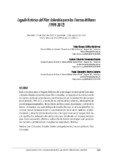Historical Legacy of Plan Colombia for the Armed Forces (1999-2012)
Legado histórico del Plan Colombia para las Fuerzas Militares (1999-2012);
Legado histórico do Projeto Colômbia para as Forças Militares (1999-2012)
Compartir este ítem
Fecha
2022-10-25Autor
Cufiño-Gutiérrez, Fabio Nelson
Fernández-Osorio, Andrés Eduardo
Sierra-Zamora, Paola Alexandra
Citación
Metadatos
Mostrar el registro completo del ítemDocumentos PDF
Resumen
This article explores the historical legacy of the U.S. Colombia binational strategy known as Plan Colombia, its impact on the structure of Colombia s military forces and the decrease in cocaine production in the period 1999-2012 through an analysis of the successes and failures of the strategies employed and the political, social, economic and military context of the time. By employing a case study methodology, the article identifies the reasons for the increase of state capacity in the defense sector, the weakening and dismantling of the structures of illegal organizations and the significant reduction of coca crops, thus providing theoretical inputs for the structuring, design and implementation of future strategies to manage complex security and defense issues. Este artículo explora el legado histórico de la estrategia binacional de Colombia y Estados Unidos conocida como Plan Colombia, su impacto en la estructura de las fuerzas militares colombianas y en disminución en la producción de cocaína en el periodo 1999-2012 a través de un análisis de los aciertos y desaciertos de las estrategias empleadas y del contexto político, social, económico y militar de la época. Al emplear una metodología de estudio de caso, el articulo identifica las razones para el incremento de la capacidad estatal en el sector defensa, el debilitamiento y desarticulación de estructuras de organizaciones al margen de la ley y la significativa reducción de cultivos de coca, brindando así insumos teóricos para la estructuración, diseño y aplicación de futuras estrategias que permitan dar manejo a problemáticas complejas en seguridad y defensa. Este artigo explora o legado histórico da estratégia binacional da Colômbia e Estados Unidos conhecida como Projeto Colômbia, o seu impacto na estrutura das forças militares colombiana e na redução na produção de cocaína no período 1999-2012 a partir de uma analises dos acertos e desacertos das estratégias utilizadas e do contexto político, social, econômico e militar da época. Ao utilizar uma metodologia de estudo de caso, o artigo identifica as razões para o aumento da capacidade do Estado no setor defesa, a debilidade e desarticulação de estruturas organizacionais à margem da lei e a significativaredução da plantação de coca, oferecendo assim elementos teóricos para a estruturação, desenho e aplicação de futuras estratégias que permitam dar manejo a problemas complexos na segurança e defesa.
Colecciones
Ítems relacionados
Mostrando ítems relacionados por Título, Autor o Palabra clave.
-
Web platform design for environmental health: a case study in Colombia
Ordonez, Armando; Sierra-Torres, Carlos H.; Mejia, Jessner (Universidad de MedellínFacultad de IngenieríasMedellín, 2019-06-28) -
Estacionalidad del gasto en salud en Colombia, 2011-2015
Espinosa Acuña, Óscar Andrés; Pinzón Fonseca, Daniel Andrés (Universidad de MedellínFacultad de Ciencias Económicas y AdministrativasMedellín, 2017-09-30)En este artículo se evalúa si existe estacionalidad en el gasto agregado en salud en Colombia entre los años 2011 y 2015. Para ello, se construye el gasto en salud desde las cuentas financieras de las empresas prestadoras ... -
International Contributions of Transitional Justice Experiences for Colombia
Agudelo Mejía, Dimaro Alexis; Pabón Giraldo, Liliana Damaris; Toro Garzón, Luis Orlando; Bustamante Rúa, Mónica María; Vargas Vélez, OriónThis paper addresses transitional justice experiences in South America, Central America, Europe, Africa and Asia to identify applicable contributions to transitional justice in Colombia. With an exploratory, ...


